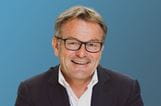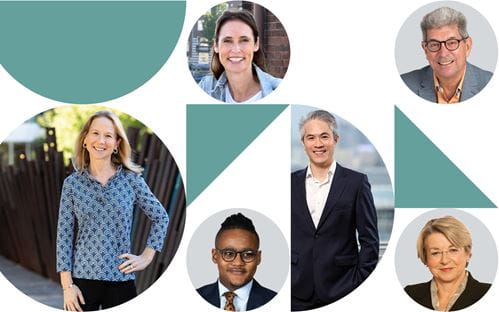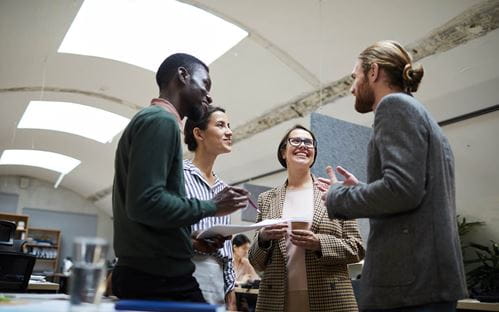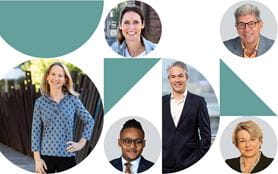Emerging stronger and better from the Covid-19 crisis
Related people
Headlines in this article
Related news and insights
Publications: 21 March 2024
Publications: 21 March 2024
Publications: 21 March 2024
Publications: 21 March 2024

Q: The past 18 months have been turbulent – how do you reflect on that period for A&O?
Gareth: We started FY21 back in May 2020 hoping for more certainty, but instead we got prolonged uncertainty as the pandemic continued.
Wim and I had spent time at the start of our term together stepping back to think about who we are as a business and where we’re going – our purpose and vision – and putting in place broad strategic pillars to help guide our decision-making. The financial performance we achieved – client revenue up 5% to GBP1.77 billion and profit before tax up 19% to GBP822 million – is a consequence of finding the right balance across the three pillars of our purpose: clients, people and society. That’s what I’m most proud of this year.
Wim: The past 18 months have certainly tested us. In May 2020 markets were still turbulent so we maintained a relatively cautious approach – focusing on cash preservation, rolling out virtual working practices and taking necessary short-term decisions – until we could better see where the markets were headed. That was not so much driven by concerns for the financial stability of our business, but was more about our partners’ determination to keep our teams together.
But the markets in the second half of the financial year were astonishing: by the end of it, every one of our transactional and disputes practices had seen revenues increase on the previous year and we delivered a strong performance across all regions, in particular the UK, Europe and the U.S.
Gareth: The drop in busyness over the first few months of FY21 was completely wiped away. We’ve recovered in a way that nobody would have predicted back then and have been able to ‘accelerate out of a corner’, as Wim puts it, because of our strong belief in a high-performance business model built on exceptional people and exceptional client service.
Q: How would you summarise your progress against strategic priorities?
Wim: Despite the crisis, our longer-term strategic priorities haven’t changed. We’re still focused on building our capabilities in important markets such as the U.S., Germany and China, as well as continuing to invest in technology both on the legal tech side for us as a business and for our clients, and also our global technology sector.
The U.S. has been a real success story in 2021. We’ve opened two offices in California – LA and Silicon Valley – and announced the opening of a third in San Francisco, which are a real boost to our tech sector capabilities. We’ve grown by 35 partners overall since March 2020 – 30 lateral hires and five internal partner promotions – which is fantastic.
Driving more action on diversity and inclusion (D&I) continues to be a big priority across our business too, as does reducing our carbon footprint. These are issues that our people, clients and, frankly, wider society take very seriously, which allows us to push harder on them.
Gareth: Both D&I and carbon footprint priorities link in with our wider focus on sustainability and ESG (environmental, social and governance) goals. In some senses, ESG is a bit like digitalisation in that it affects everything we’re doing internally and with clients. It’s one of the biggest issues for corporate boards right now and presents a lot of opportunities.

Driving more action on diversity and inclusion (D&I) continues to be a big priority across our business too, as does reducing our carbon footprint. These are issues that our people, clients and, frankly, wider society take very seriously.
Wim Dejonghe
Q: Tell us about the carbon footprint target you have set.
Wim: We’ve worked with an expert to conduct a full analysis of our impact and set ourselves a target of a 50% reduction in absolute annual global carbon emissions by 2030, from a base year of 2019, before the pandemic started. This is independently assessed and approved by the Science-Based Targets initiative, which means it’s consistent with the most ambitious goals of the Paris Agreement.
Gareth: Within this, air travel is an obvious area to look at as it accounts for more emissions than the combined electricity and gas consumption in our buildings. We don’t want to stop people getting together completely – connectivity is a key enabler of our business – but we know now that a lot of meetings we would previously have flown to can be done virtually just as effectively.
We’ll also be reviewing office space around the world as we expect many people to continue working from home for some time each week. This is a big piece of work for us but one that will bring major benefits.
Q: With the added pressures of the pandemic, how are you addressing people’s wellbeing?
Gareth: This has been an incredibly hard time for a lot of people – dealing with isolation, separation from family and friends, going in and out of lockdowns, home-schooling children, working from laptops in small spaces – so it’s been more important than ever to stay close and understand what people need. Initially, that was practical support to ensure everybody had the right equipment to work remotely, but as the crisis has continued it’s become more about keeping people connected and protecting their mental and physical wellbeing.
Wim: Our network of Mental Health Advocates across the firm has really helped us to spot issues and embed the principles of the Mindful Business Charter we’ve signed up to.
Gareth and I normally have a lot of informal contact with colleagues when we visit offices, but moving to a virtual environment removes that and, if you’re not careful, reduces contact to a series of one-hour meetings, so you lose the human connection. Our feeling was that to keep people connected we had to set the tone from the top. I wrote a monthly blog to share my own experiences, including recovering from a serious bike accident, and received so many responses from people sharing their stories too, which was wonderful but also showed how much some were struggling.
Gareth: When you’re not getting together in person, sometimes you can’t see where the problems are. But we felt that if you could see the most senior person in the firm sharing personal challenges, you might do the same, and then all of a sudden you don’t feel quite so alone with some of your challenges.
If you could see the most senior person in the firm sharing personal challenges, you might do the same, and then all of a sudden you don’t feel quite so alone with some of your challenges.
Gareth Price
Q: How have you stayed connected to our alumni community throughout the pandemic?
We really hoped our face-to-face events would start up again in 2021, especially our Global Alumni Reunion, but it just hasn’t been possible. We’ve been able to resume some small events but the focus has again been on finding ways to stay connected with our alumni community virtually. We hosted our first Alumni Week in November: a takeover by alumni leading a whole range of events and sessions with authors, historians, and health and wellbeing experts. The variety of things our alumni are doing is amazing.
We’ve also seen an increased interest in our mentoring programme that pairs A&O staff and partners with alumni, which has given us another way to support people during the pandemic. We’ve expanded the programme and now have A&O and alumni mentors in 16 locations around the world.
Q: Another priority you mentioned is D&I - what progress have you made and what is your focus going forward?
Wim: The first thing to say is that I don’t believe any organisation in today’s world can sustain its success without being diverse and inclusive. A huge amount of work is going on across our business on this, so this year we launched All In, which is our commitment to creating an inclusive environment that celebrates and embraces difference.
Progress can appear slow, but I see a real change in that diversity is now part of every talent discussion. That’s how, long term, we will achieve the diverse partnership and organisation we want. Different offices have different challenges but we’re pushing at a very granular level for teams to work as hard as they can.
The thing that links everything together is inclusion: that’s where the main challenge is and it’s why we need to increase our understanding, remove unconscious bias and have more open conversations. It requires cultural change, which means each of us must be conscious of the impact we have on those around us. It’s not something that happens overnight but I see real commitment to this.
Gareth: When you join a global firm, your background and your experiences prepare you in different ways. Part of that could be your social background, your race and ethnicity, gender, sexual orientation or disability. The point is, we have to be an organisation that’s open to everyone and celebrates all the differences people bring. That’s what makes us relevant and innovative and it’s the belief behind All In.
Wim: In terms of priority areas, we’re still very focused on race and ethnicity. We did a big review of our data in London and were the first firm to publish what’s known as ‘ethnicity stay gap’ figures, which highlight the issue in our profession of retaining ethnic minority, and particularly black, lawyers who leave their firms on average earlier than their white counterparts. We’ve now set targets for recruitment and progression to tackle this.
Internationally, we’ve had colleagues sharing their stories to build a better understanding and to encourage more conversations about race. We should be extremely grateful to these colleagues, actually, because it’s not easy to tell your story in front of your peers or indeed your bosses.
In terms of gender, we’re continuing to make progress – 45% of partner promotions in 2020 were women and this year it was 33% – so we’ve achieved our target of having at least 30% women in our partnership candidate pool by 2021. But that was never the end goal, so we’re looking again at targets for gender.
Gareth: One area we’re talking more about is the importance of allyship for minority groups. For our LGBTQ+ community, for example, we want A&O to be a supportive place to be openly ‘out’ because, for some, life outside of work is not. Ensuring visible and vocal support through active allyship is therefore crucial, particularly during lockdowns, so we’ve been working to show what that looks like. Our new global disability network, AccessAbility, is playing an important role in that too.
Socio-economic background is also a growing area of focus and something I personally feel strongly about, particularly as it often compounds other barriers within our profession. I was invited to join the advisory board to the independent task force commissioned by the UK government and run by the City of London Corporation, which aims to improve socio-economic diversity at senior levels in financial and professional services across the UK. But it’s by no means an issue confined to the UK: helping those with potential rather than the most polished individuals shine through and progress is a challenge every country faces. I’m also delighted to see that the focus of our new global charity partnership is helping young people break out of cycles of deprivation.

A&O will always be a people business, but one that’s increasingly powered by technology. It’s the future of law.
Gareth Price
Q: On that subject, what have been your other pro bono and community investment achievements this year?
Wim: We concluded our global charity partnership with Hope and Homes for Children in July, having extended it to continue our support during the pandemic. We contributed GBP2.3m overall – which is remarkable given that we couldn’t run our normal programme of fundraising events for much of the time – which enabled the charity to reach 136,000 at-risk children in 2020 alone. That was a record for it.
Gareth: It’s also remarkable that our pro bono hours increased by 11% this financial year to nearly 49,000. It says a lot about the people we have here that even during a difficult period they made more time to support others. We’ve also recently changed our policy to ensure that every hour of legal pro bono work now counts as chargeable time for our lawyers, which we hope will encourage more involvement. It’s such valuable experience for everybody to gain.
Q: Advanced Delivery & Solutions has been a big focus for A&O in recent years. What’s new?
Gareth: One thing we’ve taken from the past 18 months is that fundamentally A&O will always be a people business, but one that’s increasingly powered by technology. It’s the future of law.
For me, Fuse continues to be one of the most exciting areas of our business. It’s our innovation hub where we provide an environment for cohort members, clients and our lawyers to combine world-class legal analysis with the best technology. We brought in a new cohort of 11 start-up companies from around the world in May; they’re developing solutions to address issues such as ESG and cryptocurrency compliance.
A&O Belfast is also a great model for providing specialist support and knowledge to clients, so we’re looking at expanding that to other parts of the world to provide 24/7 coverage. I think clients have also found Peerpoint very valuable in offering quality contract lawyers at a time when businesses are dealing with unprecedented and complex staffing needs.
Q: What impact has Brexit had on A&O’s business?
Wim: So far, very little. The volume of purely UK-related work we do is quite small: London is more about English law governing global transactions. Across our Middle East, Asia and continental Europe practices a lot of work is under English law – for example, real estate finance, even when the assets are in Spain or Germany – so Brexit has not impacted that for now, but the question of the longer-term impact remains to be seen.
Q: What does the next 12 months look like as people return to the office?
Wim: I think it will take time to settle into a new ‘normal’, but my personal view is that offices will become more collaborative spaces where people come to work together rather than work individually – not only in the legal industry but more broadly, in part driven by environmental objectives.
We want to retain the benefits of the flexibility we’ve adopted since the pandemic, but ensure that we don’t lose the benefits of working together in person. We expect to see 40% of work done remotely and teams will agree how best to organise themselves in the way that’s most effective for their clients and the team.
Gareth: We all possess, sometimes without knowing it, tacit knowledge that’s vital to the performance of the business. Sharing this non-codified knowledge between colleagues – and indeed generations – is one of the key reasons the office will always be at the heart of A&O.
People here really know each other; we know each other’s qualities as well as technical abilities, and that massively benefits clients. Learning and development is crucial for younger team members but it’s a lifelong experience for everyone, so we do need our people to be in the office for some of the time to maintain that knowledge transfer, collaboration and relationship-building.
We want to retain the benefits of the flexibility we’ve adopted since the pandemic, but ensure that we don’t lose the benefits of working together in person.
Wim Dejonghe
Q: Finally, as the year draws to a close, what are your reflections?
Wim: We want to keep the best of what we’ve learned from this crisis, much of which has been a greater empathy for the different priorities and challenges people face, as we’ve seen into each other’s lives more than ever, and trust that our people can balance the priorities of work and home life in ways that suit them.
We’ve come through this in a strong position entirely because of the commitment of our people, both to each other and to our clients. For that, we’re immensely grateful and proud, and on a personal level, I’m so looking forward to being able to engage more with people again.
Gareth: I agree. I want every person who walks through the door of A&O and every client that works with us to feel that sense of pride along with a sense of belonging. That’s really important to me as we move forward.
This pandemic has led us all to reflect on our own outlooks and aspirations and what we truly value in our lives. One of the things I will appreciate most is the importance of connectivity and interaction – almost an implicit reliance on one another. That, I think, will inform business and politics for generations to come.
Recommended content









